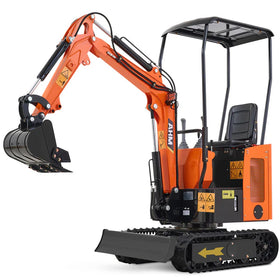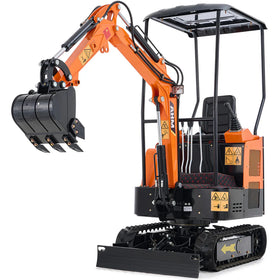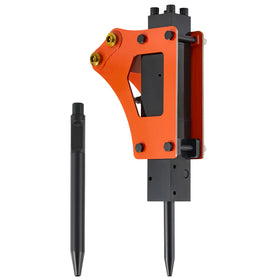There is no simple answer to whether you need a license to operate an excavator: In the U.S, whether you need a license to operate an excavator depends on which state you live in, what size excavator you're planning to run, and how you plan to use it.
Some states couldn't care less about excavator licensing, while others will hit you with hefty fines if you're caught operating without proper paperwork. Let's dig into this mess and figure out exactly what you need to know.

Do You Need a License to Operate an Excavator?
At the federal level, there's no universal excavator license that applies everywhere in the US. But that doesn't mean you can hop on any excavator and start digging holes wherever you please.
To operate an excavator legally, you've got to be at least 18 years old, have a valid driver's license, and meet whatever training requirements your employer throws at you.
Most companies won't let you near their equipment without some kind of certification, even if the law doesn't require it. Why? Because insurance companies hate paying out claims for accidents caused by untrained operators.
Now, if you're planning to haul that excavator around on a trailer, things get more complicated. Any equipment with a gross vehicle weight rating over 26,000 pounds, or if you're pulling a trailer over 10,000 pounds, you'll need a Commercial Driver's License. That's federal law, and there's no getting around it.
But here's where things get really interesting - some states have decided to create their own rules for excavator operation, and boy, do they vary wildly.

State-by-State: Where You Actually Need an Excavator License
Do you need a license to operate an excavator in your state? Well, that depends on the state laws. Most states follow the federal "let employers handle training" approach, but a few have gone rogue and created their own licensing requirements.
| State | License Required | What You Need | How Often to Renew |
| Massachusetts | Yes | Class 2A Hoisting Engineer License | Every 2 years |
| Rhode Island | Yes | Hoisting license + medical card | Varies |
| Connecticut | Yes | Recently added licensing requirements | Varies |
| New York City | Yes | Hoisting Machine Operator license | Varies |
| Everyone Else | No | Employer training | N/A |
Do You Need a License to Operate an Excavator in Massachusetts?
Massachusetts is probably the strictest when it comes to excavator licensing: the state requires everyone operating excavators to have a Class 2A Hoisting Engineer License, which involves passing both written and practical exams.
- You'll need to know everything from machine components to safety protocols, hand signals, and inspection procedures.
- Plus, they want you to renew every two years with continuing education - because apparently, knowing how to dig holes expires.
Do You Need a License to Operate an Excavator in Rhode Island, Connecticut, or New York City?
- Rhode Island followed Massachusetts' lead and requires similar licensing, complete with medical cards to prove you're physically capable of operating heavy machinery.
- Connecticut jumped on the bandwagon recently, though its requirements are still being worked out.
- New York City has its own special rules for Hoisting Machine Operator licenses, but these mainly apply to crane-type operations and larger excavators used in commercial construction.
For the rest of the country? You're in luck. No state-mandated excavator licenses required, though you'll still need proper training to keep your job and your insurance company happy.

Do You Need a License to Operate a Mini Excavator?
Mini excavator licensing requirements are generally less strict than those for full-size excavators, mainly because these smaller machines pose less risk to life and property.
- If you're using a mini excavator for personal projects on your own property, like digging out that pond you've been planning or clearing some stumps, most areas don't require any certification at all.
- The rental company should give you a basic rundown of the controls and safety features, and you're good to go.
- But if you're using that mini excavator commercially, employers will still want to see some kind of training certificate.
- It's not about following the law - it's about covering their liability and making sure you don't accidentally dig up a gas line or tip the machine over.
Massachusetts has a special exception for mini excavators under 8,000 pounds. They offer a 14-day temporary permit that you can get when renting from approved facilities.
It's basically a "mini excavator learner's permit" that lets you operate the equipment legally for short-term projects.
The bottom line? Even when not legally required, getting proper mini-excavator training is always a smart move. These machines might be smaller, but they can still cause serious damage if you don't know what you're doing.

How to Get Your Excavator License (When You Actually Need One)
So you've figured out that you do need some kind of excavator license or certification. Now what? The good news is that there are several paths you can take, depending on your situation and how much time you want to invest.
Mini Excavator Operator Training Options
1. Heavy Equipment Schools
Heavy equipment schools are probably your best bet if you're serious about making excavator operation a career. Schools like Heavy Equipment Colleges of America offer comprehensive 3-week programs that cover everything from basic controls to advanced techniques.
You'll get hands-on experience with real equipment, which is invaluable when you're starting out.
2. Online Certification
If you're short on time or money, OSHA-compliant online courses can get you certified in as little as 1-4 hours. These cover all the safety protocols and basic operating procedures, though you'll miss out on the hands-on experience. They're great for meeting employer requirements quickly.
3. Try Union Apprenticeships
The International Union of Operating Engineers (IUOE) offers excellent apprenticeship programs, but they're competitive. You'll need to pass interviews and tests, but if you get in, you'll receive top-notch training with guaranteed job placement opportunities.
4. On-the-Job Training
Many employers offer their own training programs, especially if they're having trouble finding qualified operators. This is probably the most practical route if you're already working in construction or a related field.

Why AHM Mini Excavators Are Perfect for New Operators
Once you've got your excavator license sorted out, you'll need some quality equipment to practice on. This is where AHM really shines - we've designed our mini excavators specifically with new operators in mind.
What Makes AHM Different?
Beginner-Friendly Controls: Let's be honest - jumping from training to operating real equipment can be intimidating. Our excavators feature intuitive control layouts that make the transition as smooth as possible. You won't be fighting with complicated joystick patterns or confusing button arrangements.
Related: What size mini excavator do you need?
Unbeatable Value: Starting at just $5,999.99 for our AX-12B model, you're getting professional-grade equipment without the premium price tag. Compare that to other brands charging $10,000+ for similar capabilities, and the choice becomes pretty obvious.
Complete Range for Every Skill Level: Whether you're just starting out with our compact AX-12B or ready to tackle serious projects with our powerful AY-25J, we've got an excavator that matches your experience level and project requirements.
Our Top Picks for Licensed Operators
AX-12B Mini Excavator ($5,999.99): This is your perfect starter machine. At 13.5 HP with a 69-inch dig depth, it's powerful enough for real work but forgiving enough for beginners. The compact size means you can practice in tight spaces without worrying about property damage.
AX-16 Series ($8,599.99 - $9,399.99): Once you've mastered the basics, these 23 HP models offer enhanced performance with options like swing booms for increased versatility. They're still manageable for newer operators but capable enough for serious commercial work.
AY-25 Series ($25,999.99 - $26,599.99): When you're ready for the big leagues, these Perkins diesel-powered excavators deliver maximum power and reliability. The enclosed cab options make them suitable for year-round operation in any weather.

Why AHM Makes Sense for New Operators
US-Based Support: When you're learning, you'll have questions. Our US-based customer service team actually knows the equipment and can help you solve problems quickly instead of reading from scripts.
Simple Maintenance: Our excavators are designed for easy maintenance with clearly marked service points and straightforward procedures. You won't need specialized tools or training just to change the hydraulic fluid.
Proven Reliability: All our engines are EPA certified and built to last. The last thing you need as a new operator is equipment that breaks down constantly.
The Bottom Line
So, do I need a license to operate an excavator? In most of the US, the answer is no, but you absolutely need proper training. Massachusetts, Rhode Island, Connecticut, and New York City have their own licensing requirements, so check your local rules before you start digging.
Even where licensing isn't required by law, getting certified is still the smart move. It'll make you more employable, keep you safer on the job, and might even lower your insurance costs. Plus, with quality training equipment like AHM's mini excavator line, you can practice your skills without breaking the bank.







